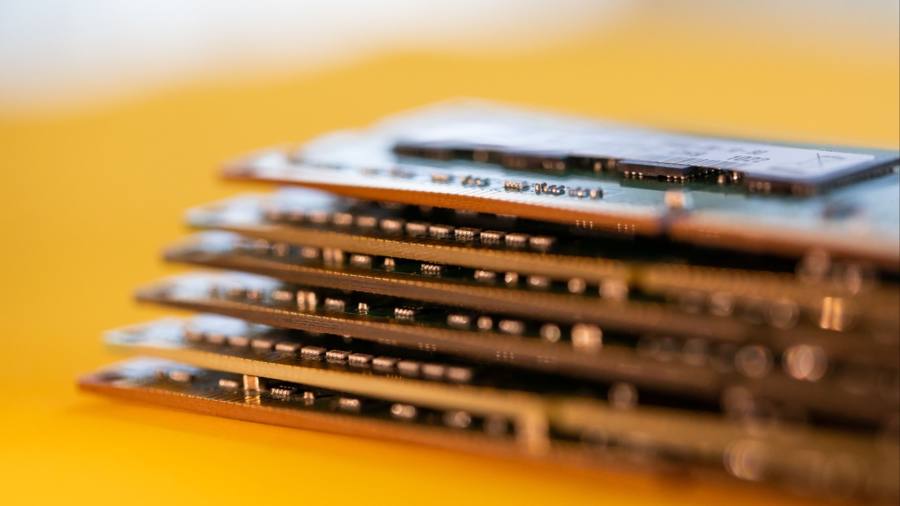A leading Chinese chipmaker is going ahead with a listing in Shanghai that will fund major expansion, after receiving confirmation from US chip toolmakers that they can supply its new production lines.
After months of uncertainty, ChangXin Memory Technologies has been told the chipmaking equipment it needs will not be subject to US export controls, according to three people with direct knowledge of the matter.
CXMT was founded seven years ago and is one of China’s biggest DRam memory-chip makers. It is also the only one capable of producing them at a miniaturisation level below 20 billionths of a metre. CXMT plans to use American equipment that can make less sophisticated chips for phones, servers and electric vehicles, bypassing the tightened requirements for exports of advanced chip tools.
The company was one of several Chinese chipmakers forced to put expansion plans for fabrication plants on hold after the US introduced its sweeping export controls on October 7 last year. Another larger Chinese memory-chip maker, Yangtze Memory Technologies, has since found workarounds to resume capital spending. Now CXMT, based in the eastern province of Anhui, is stretching its goals for growth in 2023.
“CXMT has set a very ambitious expansion target this year, even despite the memory chip downturn,” said one person with knowledge of the situation, adding that its annual capital expenditure would increase by about $4bn in 2023 as it boosted purchases of chipmaking equipment.
“CXMT plans to turn to more Chinese equipment suppliers for the expansion, so the capital expenditure can be raised by $5bn or even more. Testing the relatively immature domestic equipment requires additional cash,” said another person familiar with the situation.
To fund this, it plans an initial public offering on Shanghai’s tech-heavy Star board and is in discussions with at least two possible underwriters for the listing, including Chinese bank CICC, according to three people with knowledge of the matter. The listing plans are still in their early stages, so the size and timeline of the IPO have not been determined, one banker said.
CXMT and CICC did not respond to requests for comments.
CXMT’s current valuation is well above Rmb100bn ($14.5bn), based on its technology assets and chip production capacity, said one banker close to the company. That would be well in excess of a valuation of about Rmb72bn after a fundraising round in December, according to another person close to CXMT. Current investors in its holding-company parent Innotron Memory include Alibaba, a fund controlled by smartphone maker Xiaomi and the “big fund” for chips — the National Integrated Circuit Industry Investment Fund.
The sources for its new American equipment have not been revealed, but Lam Research and KLA, two of the biggest US tool manufacturers for chipmakers, recently said the US government had issued a “clarification” that enabled them to increase sales in China this year. They said the clarification meant they could sell equipment which they previously were concerned might be barred under the October 7 export controls.
Doug Bettinger, Lam’s chief financial officer, said on a recent earnings call that the increase would be worth “a few hundred million dollars”.
On KLA’s latest earnings call, Bren Higgins, chief financial officer, said the clarification would create “some incremental opportunities to support some of the older-generation memory devices in China”. He said the additional sales would be more than $200mn.
Neither company provided any detail about which Chinese company would account for the additional sales. But one person familiar with the situation said the “clarification” would enable them to sell tools to CXMT.
Another person said the commerce department “clarification” did not change the parameters of the October 7 controls, but outlined the correct method that companies should use to calculate the nanometre level of their customers’ chips.
China feels less vulnerable about its access to memory chips, which are commoditised products dominated by non-US vendors. In April, regulators initiated a cyber security review of US memory-chip maker Micron’s technology, a move widely seen as Beijing’s first retaliatory action against Washington’s measures to prevent China from developing leading-edge chips.
Industry experts said the investigation would prompt Micron’s Chinese customers to find alternative suppliers, but CXMT’s products were not ready replacements.
“CXMT is about eight years behind Micron,” said a semiconductor consultant in China who declined to be named. “It is four generations behind Micron and has no clear path to catching up.”
Read the full article here
